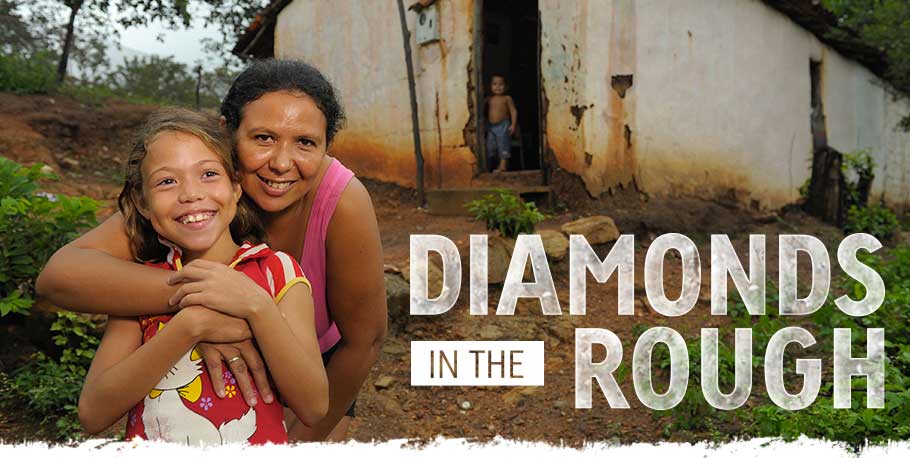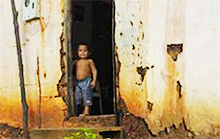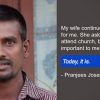Lord willing, Ben Steed and Phil Ware from Heartlight.org and VerseoftheDay.com are headed to Brazil to look in on Compassion's re-tuned focus on the poorest in Brazil and a commitment to lift children out of poverty in Jesus' name. Phil and his wife Donna have a little girl they sponsor near Fortaleza and three other children they sponsor in different places of poverty. Ben and his family also sponsor compassion children. As Heartlight and Verse of the Day close in on 1,000 sponsored children, we hope you will prayerfully consider blessing a child by being a sponsor. Since we're headed to Brazil, we thought we would give you a taste of Brazil. Thanks to Brandy for this great post and to Chuck Bigger and Ana Santos for their moving images.

Compassion Is Closing Centers in the Wealthiest Southeast While Envisioning a Different Future for Children in the Poorest Areas of Brazil.
Brazil is full of sparkling gems. The Amazon spreads across the northwest, green and lush and the site of adventures. And in the south shines Rio de Janeiro, drawing tourists to its glittering city lights and rich culture.
But there's a corner in northeast Brazil that most tourists never visit. It's away from the pristine white sand beaches, away from the World Cup stadiums and marble-floored resorts. If tourists wander into these neighborhoods, they feel they have crossed into the shadows. They are warned about these slums in their travel guides. They can't get back to their hotels fast enough.
Poverty is on every street corner, in every doorway. Nearly 30 percent of the population struggles to live on less than $2 a day. The land is fickle, one year punishing the small farms with floods, the next year with droughts. Crops regularly fail, leaving 25 percent of children chronically malnourished.
Black magic is practiced regularly, and parents whisper rumors of children kidnapped for sinister ceremonies. Northeast Brazil also suffers from the highest homicide rate in the country, with the state of Alagoas reporting an annual murder rate of more than 66 homicides per 100,000 people. That's higher than New York City, Detroit and Chicago combined.
In short, if one were to look at the health, education and income statistics of southern Brazil from the United Nations' human-development criteria, it would look much like the poorer countries of Europe. The northeast would have the poverty-stricken look of the most remote and undeveloped areas of sub-Saharan Africa.
 |
| A man picks through the Codó city dump in Maranhão to find food and other items. |
When Priscilla Veras, a supervisor with Compassion Brazil, first visited this area of the country, she felt like she had traveled to another world. "I had never experienced poverty like this," says Priscilla. "I had never seen such a lack of hope. These people didn't believe they could have a different future. They didn't think they deserved anything better."
But as she met with pastors and heard their passion for serving the poor children of their communities, she knew this was exactly where Compassion needed to be. Here, on the streets filled with gangs and violence, she found the true diamonds in the rough — boys and girls mired in poverty but dreaming of a different life.
"I cried when I met with the church leaders," she says. "But they were happy tears. I told them, where the world sees poverty, we see potential."
A Shining Light
 |
|
| Nine-year-old Thamyres lives in Maranhão, one of the poorest states in Brazil. |  |
Before Compassion came to help, 9-year-old Thamyres Pinho had never been described as a jewel and didn't fully grasp what the word "potential" meant. But now, from the moment she smiles, the darkness recedes. That smile is amplified by the contrast of her surroundings, by the violence of her neighborhood, by the heaviness of her home. When she plays with her friends she is all energy and laughter. At home, with her grieving grandmother, she is quieter. But still, she shines.
Thamyres lives in Maranhão, one of the poorest states in Brazil. Her grandmother, 56-year-old Maria, is raising her. Thamyres' mother has bounced in and out of her life, living in a home nearby but disappearing without a moment's notice.
"She was here for two years, but then she left," says Maria. "That is just how things are here."
Before, Maria had known only the hopelessness of this dusty corner of Brazil. She had lost her brother, her mother and her father, and now she was raising her granddaughter. When Thamyres began suffering from seizures at age 2, Maria saw the sickness as just one more curse her family must endure. The cost of Thamyres' medical care drove the family deeper into debt. Maria felt there was no hope for escape.
In 2011 Maria felt a foreign glimmer of hope for the first time. Thamyres was registered at a new Compassion center in her community at the age of 5. Compassion helped with Thamyres' medical bills from her continued seizures, removing a heavy burden from Maria. She saw Thamyres blossom, and the girl's laughter and dancing soon filled the home.
Finding Joy
 |
| Thamyres & sponsored kids line up for a snack outside their child development center. |
"The center is really nice," Maria says. "Thamyres learns good things there. I don't want to see my granddaughter suffering like I did — like I suffered before — so I want all good things for her."
Suffering still darkens the door of Maria's home. She recently lost a son, a loss she says nearly destroyed her. But despite her tears and sadness, she says the hope Thamyres found through Compassion is contagious — fighting off the dark.
"Even with this empty space in my life, when I spend time with my grandchild, I can find a little joy," says Maria. "I can smile with her, I can laugh a little bit."
Watch this video about the economic contrast in Brazil and how Compassion is helping children in the poorest region.









Reader Comments
Archived Facebook Comments